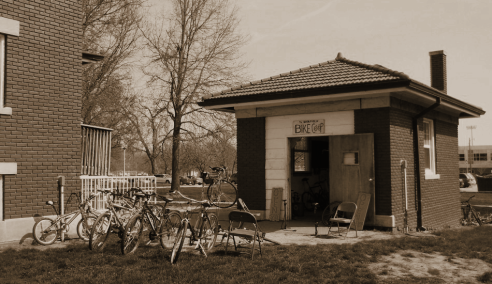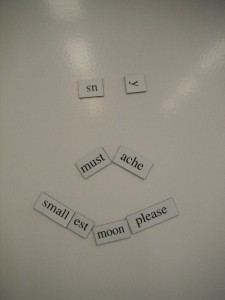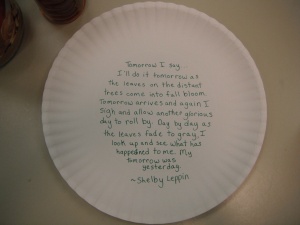One June morning, an Oxford Professor of English, whose lectures had been unattended during the summer term,* was taking a stroll of the grounds when an American journalist crossed his path, taking pictures with her large black camera. They greeted each other wordlessly, the Professor nodding his head sideways and half-smiling, the Journalist raising her eyebrows civilly.
Then the Journalist remembered something.
“Excuse me, sir,” she called after him. “I have a quick question for you, if you don’t mind.”
“Of course,” said the Professor readily. “That is to say—I believe I have time for a question, so long as it is, as you say, quick,” he added, though he was secretly delighted by the distraction.
“I am an American journalist here to report on medical research at Oxford, but I love literature, too,” said the Journalist. “And I was afraid I would end up visiting this place without ever getting to ask an Oxford prof about the Oxford comma!”
“Oh dear me,” said the Professor, preparing himself for a bitter argument. “I fear we will find we have great difference of opinion on this matter.”
“Well, maybe not,” said the Journalist. “We’ll see. You probably know that the Associated Press Stylebook has for years mandated that when you list items in a simple series, you should use commas, but not before the conjunction. In other words, you ought to say, ‘Richard Nixon was a fraud, a liar and a crook,’ no comma before the ‘and.’”
“Just so,” said the Professor. “And you know, of course, that the University of Oxford Press has—since time immemorial—preferred a comma for the final item of the series, before the conjunction. Thus you would have ‘Guy Fawkes was a Jesuit, an Englishman, and a traitor,’” he concluded, saying ‘comma’ aloud punctiliously each time it occurred in his example.
“Yes,” said the Journalist. “And in an American context, we see that comma as unnecessary, and a sort of affected Anglicization. An American using it is trying to put on airs—like spelling ‘gray’ with an ‘e.’”
“Well now,” said the Professor. “You Yanks are always so brutally forthright in your opinions and your series of items, no helpful pauses to allow what has been said already to be digested properly. And what would be so wrong with re-Anglicization, after all?”
“You have to admit, though, that in a simple series, the comma is not necessary for the meaning of the sentence,” said the Journalist.
“Sure, I will grant you that,” said the Professor. “But does precedent and tradition mean nothing to you?”
“Eh,” said the Journalist, squinting her eyes thoughtfully. “It depends what the tradition is, I suppose.”
“However, I am afraid I now have the minority view, even within the school from which the serial comma gets its name,” began the Professor wearily. “The revised University of Oxford Press Styleguide now says, and I quote, ‘As a general rule, do not use the serial/Oxford comma: so write ‘a, b and c’ not ‘a, b, and c’. But when a comma would assist in the meaning of the sentence or helps to resolve ambiguity, it can be used – especially where one of the items in the list is already joined by ‘and.’ See what they have done, those iconoclastic, hair-shirted villains!” he cried rather loudly, frightening a magpie from a nearby branch.
“I’m sorry for your loss,” said the Journalist kindly.
“Still and all, there are instances when even your cold, utilitarian AP Stylebook admits that the serial comma is absolutely necessary,” said the Professor.
“It’s true,” said the Journalist. “For example, and I quote from the Stylebook: it should be used ‘if an integral element of the series requires a conjunction: ‘I had orange juice, toast, and ham and eggs for breakfast,’” she said, verbalizing each comma. “Since ‘ham and eggs’ is a set phrase that includes ‘and,’ there has to be a comma before the first ‘and.’”
“Correct,” said the Professor. “But there are even more serious cases in which a comma is non-negotiable—in which grave ambiguities could result from a lack of punctuation!”
“What cases do you have in mind?” asked the Journalist.
“Good gracious, it gives me goose-flesh just to think of them,” said the Professor, shuddering. “But one of the most noxious is the following: ‘This book is dedicated to my parents, Ayn Rand and God.’”**
“What’s the big deal?” asked the Journalist, taking out her notebook.
“Why, don’t you see?” said the Professor. “Punctuated in that way, the sentence seems to suggest that the writer’s parents are Ayn Rand and God!”
“Holy Deepthroat, Batman!” exclaimed the Journalist, scribbling illegibly. “I see what you mean now.”
“Yes, yes, perhaps now you see why we at Oxford have traditionally chosen careful restraint over incautious assumptions of clarity.”
“Sure, I can. Yet I hope you will agree that there is some merit to our side of the story. In so many contexts, the serial comma is just clutter, an extra stumbling block. For example, in the sentence ‘Duke Ellington composed, arranged, and played jazz music,” that comma just steps on the flow of the sentence, like a false note.”
“Of course, yes. Verily so. It seems we all live just long enough to see ourselves proved the fool,” said the Professor ruefully. “Perhaps, at least, you can learn from my mistake, and prepare yourself for the day when the next generation will be making fun of your most beloved institutions—Twitter, perhaps, or Greek yogurt. Vile stuff, really, wouldn’t you agree?”
“Ha!” laughed the Journalist. “The sun will never set on Greek yogurt’s day. However, thank you very much for your time, sir. Our conversation has been illuminating.”
“And the same to you,” said the Professor. “I always enjoy speaking with our American friends.”
They shook hands and parted ways. For some days afterward, the Journalist hesitated just a moment before plunging her spoon into her Greek yogurt.
*Gerard Manley Hopkin’s “On the Origin of Beauty: A Platonic Dialogue” begins with the same premise—of an unattended Oxford professor with too much time to muse upon a subject.
**Example taken from Mental Floss article: “The Best Shots Fired in the Oxford Comma Wars.” They have many other fun examples, and arguments for and against the serial comma: http://mentalfloss.com/article/33637/best-shots-fired-oxford-comma-wars



